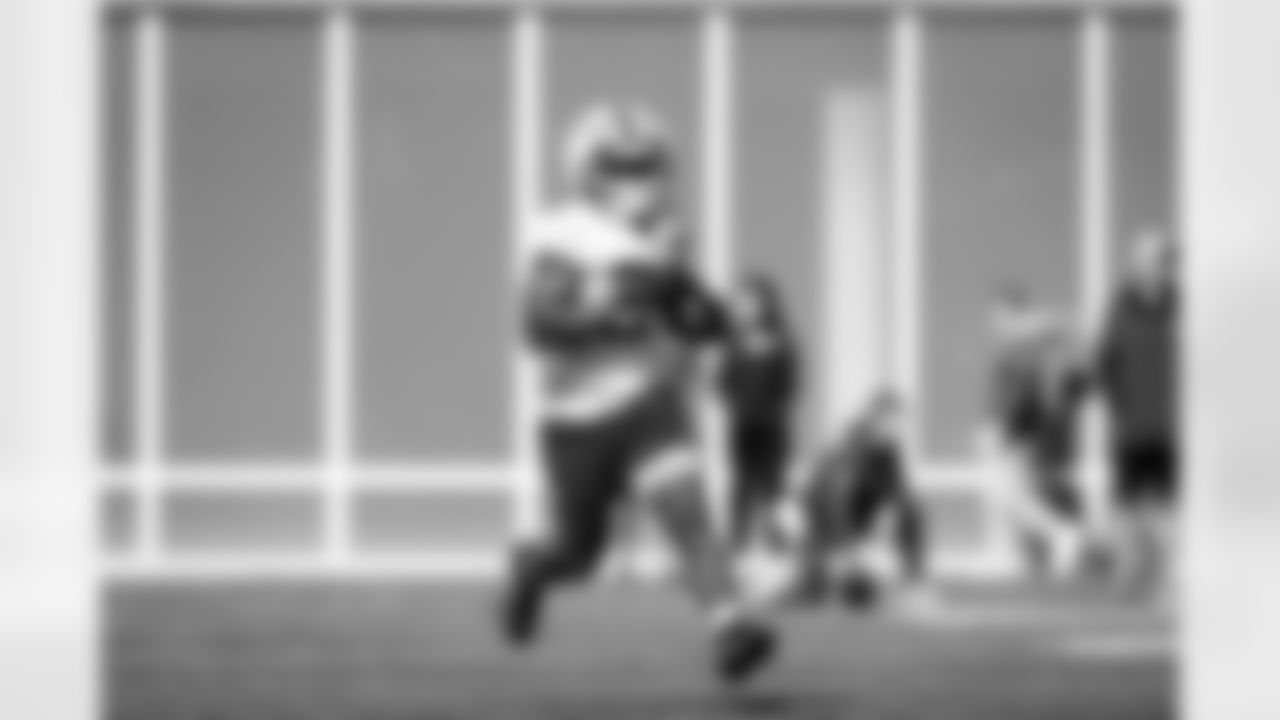The Browns will travel to Philadelphia on Sunday to take on the Eagles in their third consecutive road game of the season.
Looking to snap a three-game losing streak, the Browns will face an Eagles team full of offensive weapons in QB Jalen Hurts and wide receivers A.J. Brown and DeVonta Smith.
Here are three questions to consider going into the Browns' Week 6 game against the Eagles.
Can the defense build on its growing turnover streak?
After starting the season without a defensive turnover in the first two games, the Browns defense has recorded at least one turnover in each of its last three games.
In Week 5 against the Commanders, LB Jeremiah Owusu-Koramoah made a clutch interception in the first quarter after the defense had allowed Washington to advance to its 5-yard line.
On the first play of the second half, Owusu-Koramoah punched the ball out of WR Terry McLaurin's arms and CB Martin Emerson Jr. dove on the fumble.
Defensive coordinator Jim Schwartz said that the turnovers were crucial in overcoming defensive miscues – such as the 66-yard pass to McLaurin that could have led the Commanders to a scoring drive if not for Owusu-Koramoah's heads up interception.
"Obviously, the first one overcame that big pass where we ended up losing contain, let the quarterback loose and then he made a big play down the field. So that was a really big red zone stop. But the forced fumble was a big time play and had the ball on the ground a couple of times," Schwartz said on Thursday. "We had a couple bit hits that ended up being incompletions that had a chance. I mean, they are a whisker away from being catch-fumbles. So, I was proud of the way we were around the ball."
The Eagles are tied for the fifth-most turnovers in the NFL this season with eight, losing four fumbles and throwing four interceptions. Capitalizing on their turnover tendencies will be crucial for the Browns defense as they try to contain an offense that has the ability to be explosive.
Check out photos of the team working to prepare for their game this week against the Philadelphia Eagles at CrossCountry Mortgage Campus


Defensive end Ogbo Okoronkwo (54) during practice at CrossCountry Mortgage Campus on October 9, 2024.

Running back Nick Chubb (24) during practice at CrossCountry Mortgage Campus on October 10, 2024.

Kicker Dustin Hopkins (7) during practice at CrossCountry Mortgage Campus on October 10, 2024.

Wide receiver Elijah Moore (8) during practice at CrossCountry Mortgage Campus on October 10, 2024.

Defensive tackle Mike Hall Jr. (51) during practice at CrossCountry Mortgage Campus on October 9, 2024.

Wide receiver Jerry Jeudy (3) during practice at CrossCountry Mortgage Campus on October 10, 2024.

Head Coach Kevin Stefanski during practice at CrossCountry Mortgage Campus on October 9, 2024.

Wide receiver Jerry Jeudy (3) during practice at CrossCountry Mortgage Campus on October 10, 2024.

Quarterback Deshaun Watson (4) during practice at CrossCountry Mortgage Campus on October 9, 2024.

Offensive guard Germain Ifedi (65) during practice at CrossCountry Mortgage Campus on October 10, 2024.

Defensive end Isaiah McGuire (57) during practice at CrossCountry Mortgage Campus on October 10, 2024.

Defensive end Marcus Haynes (98) during practice at CrossCountry Mortgage Campus on October 10, 2024.

Cornerback Cameron Mitchell (29) during practice at CrossCountry Mortgage Campus on October 9, 2024.

Defensive end Za'Darius Smith (99) during practice at CrossCountry Mortgage Campus on October 9, 2024.

Wide receiver James Proche II (11) during practice at CrossCountry Mortgage Campus on October 10, 2024.

Cornerback Martin Emerson Jr. (23) during practice at CrossCountry Mortgage Campus on October 9, 2024.

Wide receiver Cedric Tillman (19) during practice at CrossCountry Mortgage Campus on October 10, 2024.

Quarterback Jameis Winston (5) during practice at CrossCountry Mortgage Campus on October 9, 2024.

Running back Jerome Ford (34) during practice at CrossCountry Mortgage Campus on October 9, 2024.

Cornerback Cameron Mitchell (29) during practice at CrossCountry Mortgage Campus on October 9, 2024.

Linebacker Jeremiah Owusu-Koramoah (6) during practice at CrossCountry Mortgage Campus on October 9, 2024.

Safety Trey Dean (28) during practice at CrossCountry Mortgage Campus on October 10, 2024.

Offensive tackle Sebastian Gutierrez (60) during practice at CrossCountry Mortgage Campus on October 10, 2024.

Quarterback Dorian Thompson-Robinson (17) during practice at CrossCountry Mortgage Campus on October 9, 2024.

Linebacker Mohamoud Diabate (43) during practice at CrossCountry Mortgage Campus on October 9, 2024.

Defensive end Myles Garrett (95) during practice at CrossCountry Mortgage Campus on October 10, 2024.

Running back Nyheim Hines (22) during practice at CrossCountry Mortgage Campus on October 9, 2024.

Defensive end Elerson Smith (52) during practice at CrossCountry Mortgage Campus on October 10, 2024.

Linebacker Khaleke Hudson (39) during practice at CrossCountry Mortgage Campus on October 9, 2024.

Linebacker Jeremiah Owusu-Koramoah (6) during practice at CrossCountry Mortgage Campus on October 9, 2024.

Running back Nick Chubb (24) during practice at CrossCountry Mortgage Campus on October 9, 2024.

Quarterback Deshaun Watson (4) during practice at CrossCountry Mortgage Campus on October 9, 2024.

Running back Nick Chubb (24) during practice at CrossCountry Mortgage Campus on October 9, 2024.

Wide receiver Elijah Moore (8) during practice at CrossCountry Mortgage Campus on October 10, 2024.

Cornerback Tony Brown II (38) during practice at CrossCountry Mortgage Campus on October 10, 2024.

Defensive end Myles Garrett (95) during practice at CrossCountry Mortgage Campus on October 10, 2024.

Linebacker Jordan Hicks (58) during practice at CrossCountry Mortgage Campus on October 10, 2024.

Linebacker Winston Reid (59) during practice at CrossCountry Mortgage Campus on October 9, 2024.

Defensive tackle Jowon Briggs (97) during practice at CrossCountry Mortgage Campus on October 10, 2024.

Wide receiver Amari Cooper (2) during practice at CrossCountry Mortgage Campus on October 10, 2024.

Defensive end Sam Kamara (92) during practice at CrossCountry Mortgage Campus on October 10, 2024.

Wide receiver Kadarius Toney (87) during practice at CrossCountry Mortgage Campus on October 9, 2024.

Defensive Coordinator Jim Schwartz during practice at CrossCountry Mortgage Campus on October 10, 2024.

Quarterback Deshaun Watson (4) during practice at CrossCountry Mortgage Campus on October 10, 2024.
Can the secondary keep star Eagles receivers from making explosive plays?
The Eagles offense will get a huge boost Sunday as Brown and Smith will return after missing time due to injury. The duo of wideouts is among the league's best, combining for over 2,500 receiving yards and 14 receiving touchdowns last season.
"Both of those guys are really good players," Schwartz said. "Different style players. A.J. Brown is a guy that can take a hitch and go 80 yards because he's so strong. He's really strong down the field on his deep balls. And DeVonta Smith has really great speed. He's a smaller player, but he's got great quickness and great speed."
The Browns defense has allowed 14 passing plays of 20 or more yards this season, four of which came in last week's loss to the Commanders.
In his only game this season, Brown exploded for 119 yards and a touchdown, including a 67-yard house call in the third quarter of the Eagles' Week 1 win over the Packers. Smith has had at least 76 receiving yards in each of his three games played this season.
Missed tackles have been a culprit behind the Browns' propensity to giving up big plays this year. Schwartz said that big plays were the defenses' biggest issue in the Browns' loss to the Commanders.
"We had seven plays where I think it accounted for about 280 yards of offense and it sort of erased – I think we had 58 plays where we gave up like 2.5 yards per play. That 2.5 yards per play is like insane defense, but it gets offset by those seven big plays," Schwartz said. "I thought the players did a good job with the challenge and everything, but we lost contain a couple times to our left, we missed some tackles, and when it was all said and done, it negated some really good stuff on film."
Can the Browns offense find more success on early downs?
The Browns are averaging just 3.6 yards per play on first downs this season, the lowest total in the NFL. On second down, they aren't faring much better, averaging 4.4 yards per play, the fifth fewest in the league.
Their issues to make big plays on early downs were a problem against the Commanders, as the Browns had a 48 percent success rate on first downs and a 21 percent success rate on second downs. A first down play is deemed successful if the offense gains 40 percent of the yards needed for a first down and a second down play is successful if the offense gains 60 percent of the yards needed to move the chains.
As a result of their lack of success on early downs, the Browns have had trouble on third down conversions, only converting on one of the 13 third downs faced against the Commanders.
"Anytime you could have that first and second down production to give yourself a good chance on third and shorter yardages, that's definitely going to help you," offensive coordinator Ken Dorsey said Thursday. "So, I think that's always a focus for us, is staying in the green and having good first and second down production."
Throughout the week, coaches and players emphasized the importance of proper execution, citing missed assignments as a primary reason behind the offense's struggles so far this season. Penalties, dropped passes and missed blocks have resulted in a Browns offense that has yet to score over 20 points this season.
In the first drive of the second half against the Commanders, the Browns appeared that they would go for it on fourth down in the red zone instead of settling for a field goal. However, because 12 players were on the field for the huddle, the Browns had to take a penalty and attempt a field goal already down 21 points.
"It just comes down to all of us being better," Dorsey said. "In that situation on the fourth down, we got to be significantly better communicators starting with the sideline and then coming in and out of the huddle, make sure we're communicating personnel so that everybody's on the same page."














